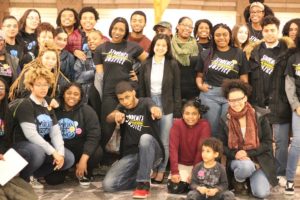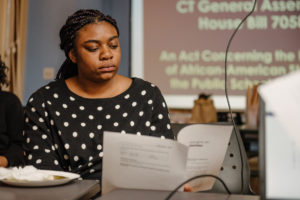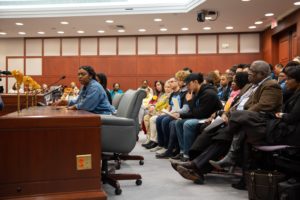By Benie N’sumbu
(c) Connecticut Explored Inc., Winter 2022-23
Subscribe/Buy the Issue!
I attended Connecticut public schools since kindergarten, but it wasn’t until my senior year of high school that I finally had the option to take an African American History course. Up until then, my education on Black history comprised what I like to call “fun fact sessions” where teachers would recite generic facts about slavery and the Civil Rights Movement. I never learned about the construction of race and racism, the continent of Africa, or even about the present-day struggle for social justice. It was up to me to find this information myself.
 During my sophomore year of high school, I joined Students for Educational Justice (SEJ). At that time, SEJ was gearing up to launch a youth-led campaign to get race and ethnicity studies in all New Haven public high schools. Around the same time, our colleagues at Citywide Youth Coalition, another youth-led organizing group, informed us that State Representative Bobby Gibson had just introduced an Act Concerning the Inclusion of African American History in all Connecticut public schools. Immediately after finding out about the bill, our executive director at the time, Hillary Bridges, called Representative Gibson’s office and scheduled a meeting with him. To our surprise, he drove down to the SEJ office in New Haven and sat with our team to discuss the bill, our campaign, and how we could work together. Gibson informed us that the bill came from his frustration over the lack of Black history in the public school curriculum. SEJ shared his frustration, but our campaign stemmed from the lack of education on race and racism. We understood that in order to create an anti-racist society, we must teach young people about the ways in which this racist system has harmed and continues to harm marginalized racial and ethnic groups.
During my sophomore year of high school, I joined Students for Educational Justice (SEJ). At that time, SEJ was gearing up to launch a youth-led campaign to get race and ethnicity studies in all New Haven public high schools. Around the same time, our colleagues at Citywide Youth Coalition, another youth-led organizing group, informed us that State Representative Bobby Gibson had just introduced an Act Concerning the Inclusion of African American History in all Connecticut public schools. Immediately after finding out about the bill, our executive director at the time, Hillary Bridges, called Representative Gibson’s office and scheduled a meeting with him. To our surprise, he drove down to the SEJ office in New Haven and sat with our team to discuss the bill, our campaign, and how we could work together. Gibson informed us that the bill came from his frustration over the lack of Black history in the public school curriculum. SEJ shared his frustration, but our campaign stemmed from the lack of education on race and racism. We understood that in order to create an anti-racist society, we must teach young people about the ways in which this racist system has harmed and continues to harm marginalized racial and ethnic groups.
Although we were excited about the bill, ultimately we wanted a course that would teach young people about the history of race and racism in the United States. We feared that the original language of the bill, which only stated that this would be for an African American Studies course in Connecticut public schools, would not effectively achieve this goal. We knew that the language would make it easy for educators to continue teaching “fun facts.” For this reason, our team decided to create amendments for the bill. The amendments called for:
- The course to be named “A History of Race and Racism in the United States” to ensure that educators and school districts would teach about race and racism, not just fun facts. The name change would also allow for the histories of other marginalized racial and ethnic groups to be taught, as we are all impacted by racism.
- An oversight committee that would comprise educators and students so that those who would be most impacted by the course would have a hand in its development.
- Mandatory anti-racist and anti-bias trainings for educators who would be teaching the course.
 Unfortunately, our amendments were met with pushback from legislators who feared that the bill would not pass if the language was modified in this way. However, they did modify the language of the bill to include Latino and Puerto Rican history. Despite our disappointment that our amendments were not adopted, SEJ chose to move forward in support of the bill. We agreed to redirect our focus to working with educators and ensuring that the course’s curriculum would reflect our initial goals of teaching the history of race and racism. As a result, we partnered with Yale American Studies Professor Dan HoSang and our colleagues at Hearing Youth Voices to form what is now known as the Anti-Racist Teaching and Learning Collective. The Collective is a “community of youth organizers, students, teachers, and teacher educators committed to advancing anti-racist pedagogy, curriculum and practice within K-12 public schools in Connecticut” (Antiracist Teaching [full citation needed here]).
Unfortunately, our amendments were met with pushback from legislators who feared that the bill would not pass if the language was modified in this way. However, they did modify the language of the bill to include Latino and Puerto Rican history. Despite our disappointment that our amendments were not adopted, SEJ chose to move forward in support of the bill. We agreed to redirect our focus to working with educators and ensuring that the course’s curriculum would reflect our initial goals of teaching the history of race and racism. As a result, we partnered with Yale American Studies Professor Dan HoSang and our colleagues at Hearing Youth Voices to form what is now known as the Anti-Racist Teaching and Learning Collective. The Collective is a “community of youth organizers, students, teachers, and teacher educators committed to advancing anti-racist pedagogy, curriculum and practice within K-12 public schools in Connecticut” (Antiracist Teaching [full citation needed here]).
 My experience advocating for this bill taught me that power lies in the community. We were able to garner more public support around the bill and educate folks on the legislative process thanks to the help of our friends at Hearing Youth Voices, CT Students for a Dream, and Citywide Youth Coalition. This bill would not have become law without their help. The Anti-Racist Teaching and Learning Collective would not exist were it not for the educators and young people who believe in and practice anti-racist pedagogy. Although I have long graduated from high school, I have trust in the educators, community leaders, and young people who will fight to ensure that true U.S. history is taught in Connecticut schools.
My experience advocating for this bill taught me that power lies in the community. We were able to garner more public support around the bill and educate folks on the legislative process thanks to the help of our friends at Hearing Youth Voices, CT Students for a Dream, and Citywide Youth Coalition. This bill would not have become law without their help. The Anti-Racist Teaching and Learning Collective would not exist were it not for the educators and young people who believe in and practice anti-racist pedagogy. Although I have long graduated from high school, I have trust in the educators, community leaders, and young people who will fight to ensure that true U.S. history is taught in Connecticut schools.
In the Fall, 2022 Connecticut public high schools began to offer “African American/Black and Puerto Rican/Latino Studies” courses.
Benie N’sumbu is a writer and activist. While attending high school, she joined Students for Educational Justice where she taught political education to her peers and organized for the passing of PA 19-12. She is also the co-founder of the Liberation Table, a Black diasporic tradition that offers Black people an opportunity to host family and friends over a traditional meal with African roots.
